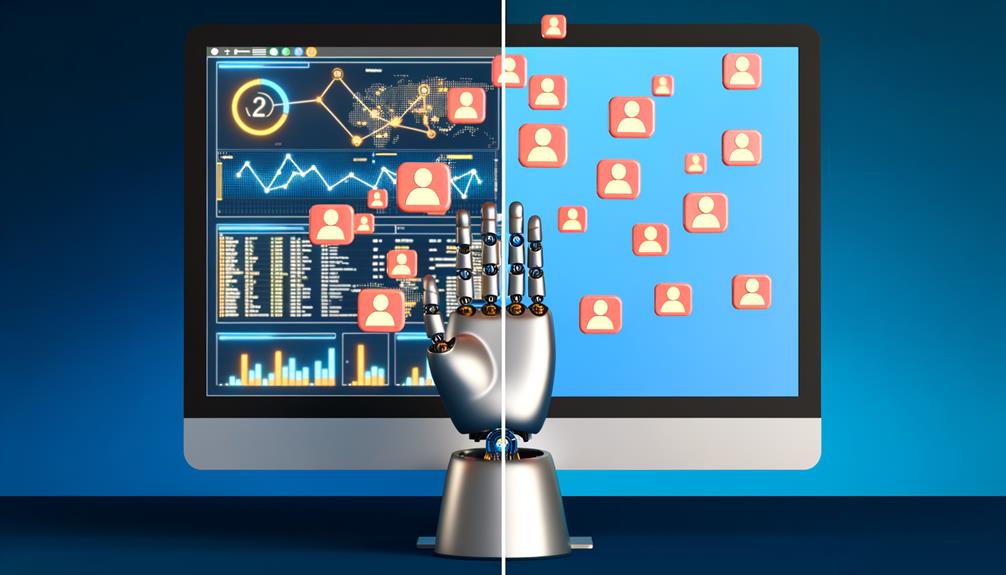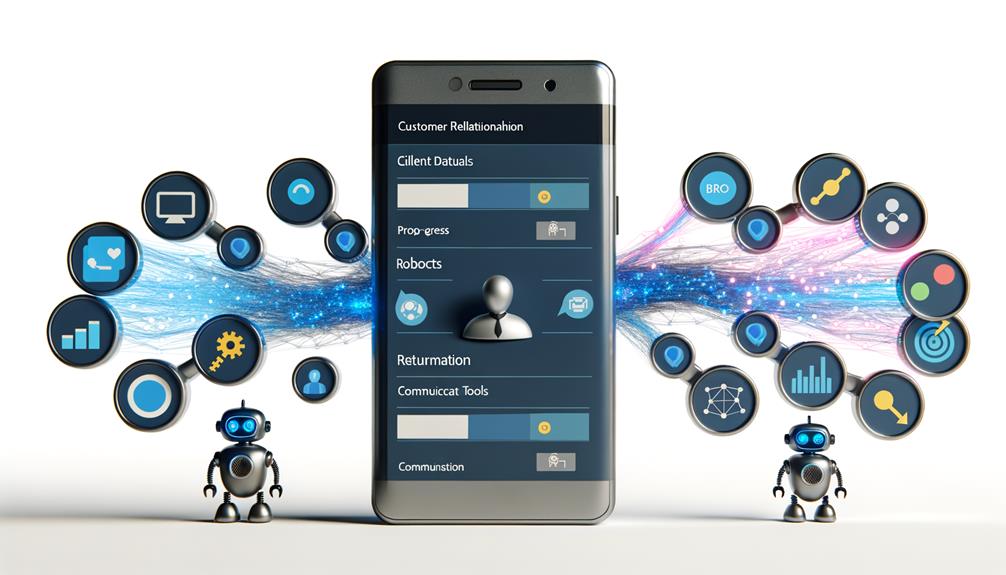Real-time analytics in CRM with AI allows you instant access to customer data, enhancing decision making and customer experience. AI algorithms process huge data streams, segmenting customers dynamically for personalized interactions. Simultaneously, AI integrates machine learning, natural language processing, and predictive analytics for processing data across multiple touchpoints. It fosters real-time insights and personalized interactions. So, while ensuring quality and securing talent could be challenges, realizing the benefits of AI-powered CRM systems, like enhanced sales forecasting, outweighs them. The more you explore this technology, the more insights you'll get about its role in transforming business operations.
Understanding Real-Time Analytics

To understand the concept of real-time analytics, you need to see it as a powerful tool that, when combined with AI in CRM, allows for the instantaneous processing and examination of massive streams of customer data. This technology provides immediate insights into customer behaviors, their preferences, and interactions across various touchpoints. It's the AI algorithms that crunch this data, enabling dynamic segmentation of customers for personalized targeting. By leveraging AI for real-time analytics, businesses can make proactive decisions and enhance customer experiences on the fly. This empowers organizations to stay agile, responsive, and customer-centric in a fast-paced digital environment. Therefore, real-time analytics is pivotal in shaping a more personalized, proactive, and ultimately, a more profitable customer journey.
Role of AI in CRM

Building on the insights offered by real-time analytics, AI's role in CRM cannot be understated as it integrates machine learning, NLP, and predictive analytics for sophisticated data processing. By enabling real-time insights across multiple customer touchpoints, AI can swiftly analyze vast datasets, improving decision-making processes. Machine learning models incorporated into CRM platforms allow for personalized customer interactions, enhancing your overall relationship with your customers. Further, AI-driven automation tools in CRM streamline data processing, continuously refining models to increase the accuracy and relevance of insights. The result is proactive customer service and numerous business growth opportunities. Therefore, AI in CRM is a transformative force, leveraging data and analytics to foster personalized interactions and real-time insights.
Benefits of AI-Powered CRM

Imagine the power of having an intelligent assistant that not only automates routine tasks but also helps in understanding and predicting your customers' behaviors. That's what AI-powered CRM systems bring to the table – enhanced sales forecasting, AI-driven relationship management, and streamlined marketing strategies. These systems use machine learning and real-time analytics to provide insights that improve efficiency, optimize performance, and drive data-informed decisions.
Enhanced Sales Forecasting
Harnessing the power of AI in CRM, your team can greatly enhance sales forecasting through meticulous analysis of historical data, customer trends, and predictive models. These AI algorithms explore the depths of your data, identifying potential sales opportunities and predicting future sales outcomes. Real-time insights provided by AI in CRM allow you to make proactive decisions, refining sales strategies and allocating resources more effectively. This precision in forecasting not only improves your understanding of customer behavior but also drives revenue generation. By leveraging predictive analytics, you gain a thorough view of your sales landscape, empowering you to act on opportunities with confidence. Essentially, AI-powered CRM transforms the art of sales forecasting into a science.
AI-Driven Relationship Management
Moving beyond sales forecasting, AI-powered CRM provides remarkable benefits in managing relationships with your customers. Harnessing AI-powered analytics, CRM systems can make data-driven predictions, anticipating customer behaviors and preferences in real time. This paves the way for AI-driven personalization, enhancing customer experiences and fostering loyalty.
Key benefits include:
- Real-time Customer Insights: Offers a holistic view of customer interactions and preferences.
- Predictive Analytics: Utilizes AI to predict future trends based on historical data.
- AI-driven Personalization: Tailors interactions to individual customers, enhancing their experience.
- Operational Efficiency: Automates repetitive tasks, freeing up time for strategic decision making.
These benefits, derived from the fusion of AI and CRM, can revolutionize your customer relationship management, leading to improved customer satisfaction and business growth.
Streamlined Marketing Strategies
How can AI-powered CRM transform your marketing strategies? By analyzing customer behaviors and preferences in real time, it paves the way for personalized marketing strategies, automates lead scoring and segmentation, and optimizes marketing channels for improved customer engagement and boosted conversion rates. This data-driven decision-making is the cornerstone of streamlined marketing strategies. Your AI-powered CRM, leveraging real-time analytics, enhances customer interactions by providing timely insights for tailored marketing approaches. The automated lead scoring and segmentation facilitate targeted campaigns, driving customer engagement and higher conversion rates. The potential of AI in customer relationship management isn't just about efficiency, it's about the capability to draw actionable insights from a sea of data, ultimately yielding more effective, personalized marketing that increases ROI and drives sustainable growth.
Real-Time Analytics: Case Studies

Delving into case studies, you'll find that companies implementing AI-driven real-time analytics in their CRM systems have witnessed substantial benefits, from heightened customer engagement and satisfaction to improved operational efficiency and effective resource utilization. These benefits have been realized through:
- Personalized interactions: Leveraging customer data for tailored engagement, leading to improved customer satisfaction.
- Efficient resource utilization: Analyzing real-time data allows for the best use of resources.
- Rapid adaptation to market dynamics: Real-time analytics enable companies to adjust swiftly to changes in the market.
- Enhanced customer engagement: Real-time analytics in CRM systems aid in understanding customer preferences, which boosts engagement.
These case studies demonstrate the significant positive impact of real-time analytics and AI-driven CRM on businesses.
Challenges With AI in CRM

While AI has proven to be a game-changer in CRM, it's not without its challenges, such as guaranteeing data quality for accurate insights, finding the right talent like data scientists and AI specialists, and setting up a robust hardware and software infrastructure. Your AI implementation depends on high-quality data flowing into CRM platforms. However, dirty or inconsistent data can skew real-time analytics, distorting user understanding of individual customer behavior. Securing talent can be difficult too; data scientists and AI specialists are in high demand, making them scarce and expensive. Additionally, a strong infrastructure is crucial for supporting complex AI processes. Finally, aligning AI endeavors with your business objectives ensures your efforts are relevant, effective, and advantageous.
Future Trends in CRM Analytics

Moving forward, it's essential to consider the emerging trends in CRM analytics, especially the enhanced integration of AI for real-time insights and personalized customer interactions. The evolving market landscape is pushing businesses to adopt AI-powered CRM platforms that offer:
- Predictive analytics: AI can forecast customer behaviors to enable proactive strategies.
- Advanced data processing: Enhanced capabilities for better decision-making and customer engagement.
- Hyper-personalization: AI-driven CRM platforms focus on delivering personalized interactions.
- Automation: Allowing businesses to streamline their operations while maintaining high levels of customer service.
Understand that these trends are shaping the future of customer relationship management. Embracing them not only helps you stay competitive but also ensures that your business is prepared for the future.
Selecting the Right AI-Powered CRM

Choosing the right AI-powered CRM for your business isn't a decision to be taken lightly; it involves careful evaluation of factors like scalability, integration capabilities, and customization options to cater to your unique business requirements. Consider how the CRM's predictive analytics and machine learning algorithms can process real-time data to help drive your decision-making. Integration capabilities are key, guaranteeing seamless connections with existing systems, data sources, and third-party applications. Look at the level of automation and AI-driven insights the CRM provides, as these can streamline processes and enhance customer interactions. It's also important to assess vendor support, training resources, and the frequency of updates to make sure that your chosen AI-powered CRM continues to evolve in line with business needs and technological advancements.
Best Practices for Implementing AI in CRM

To successfully implement AI in your CRM, it's important to consolidate data from diverse sources such as CRM databases and transaction records, enabling thorough and real-time analysis of customer information. This unified view allows AI and machine learning models to provide valuable insights through real-time analytics, improving your decision-making process.
Consider the following best practices for implementing AI in your CRM:
- Implement machine learning models for customer data analysis.
- Integrate AI-driven automation for efficient data processing.
- Continuously refine AI models based on new data for accurate insights.
- Prioritize continuous optimization to guarantee the effectiveness of AI in CRM.



